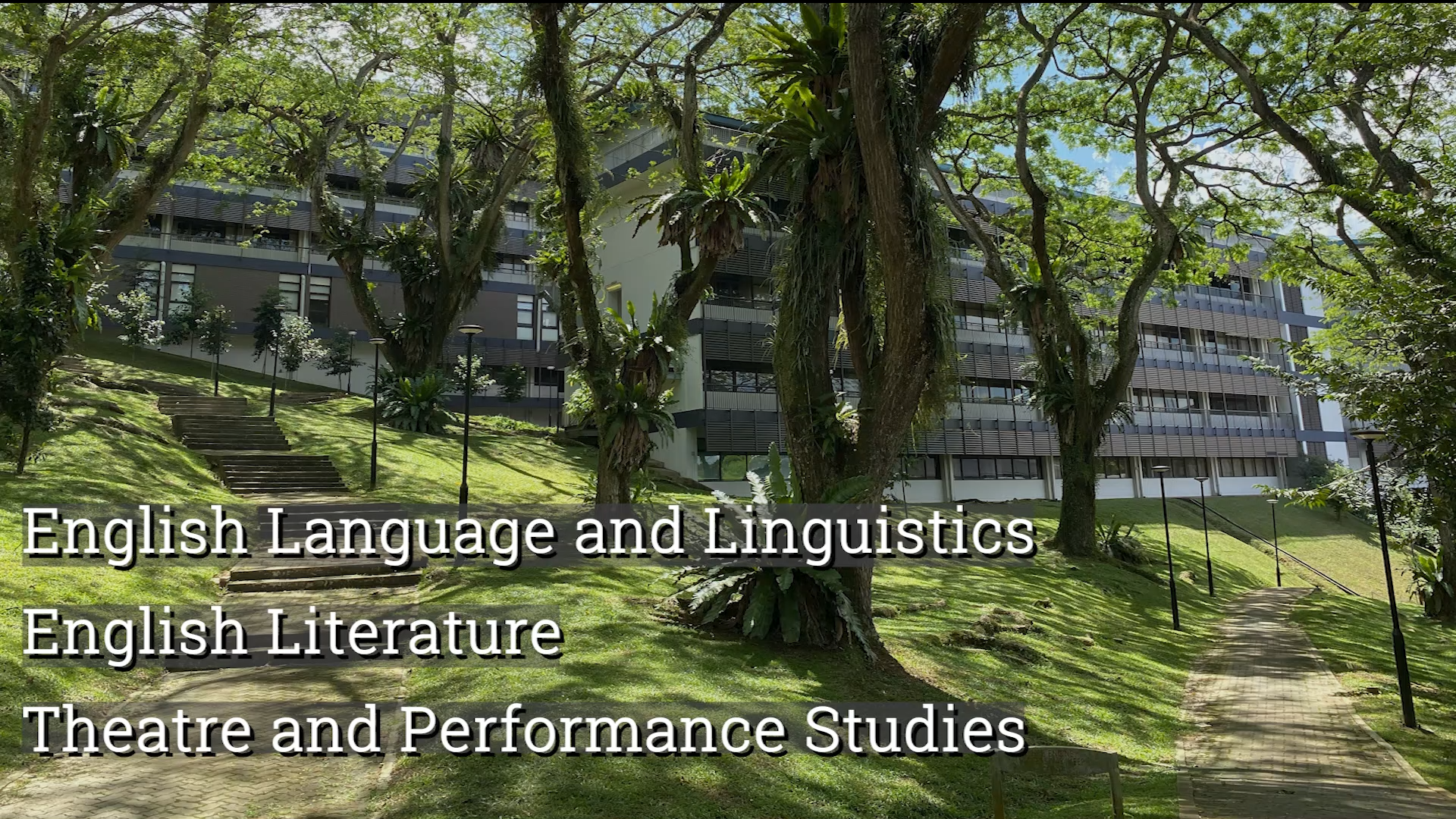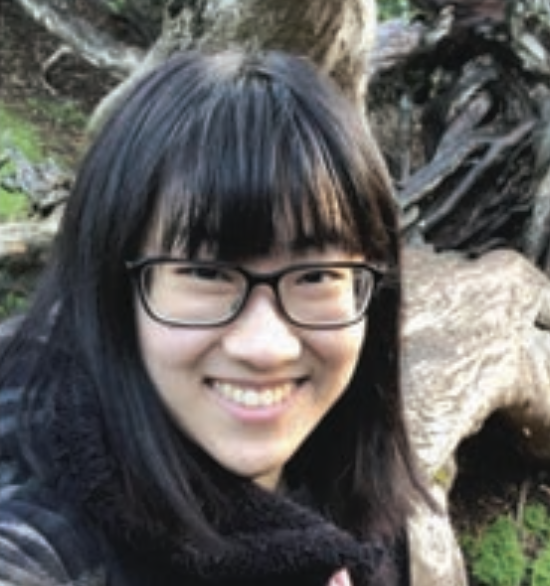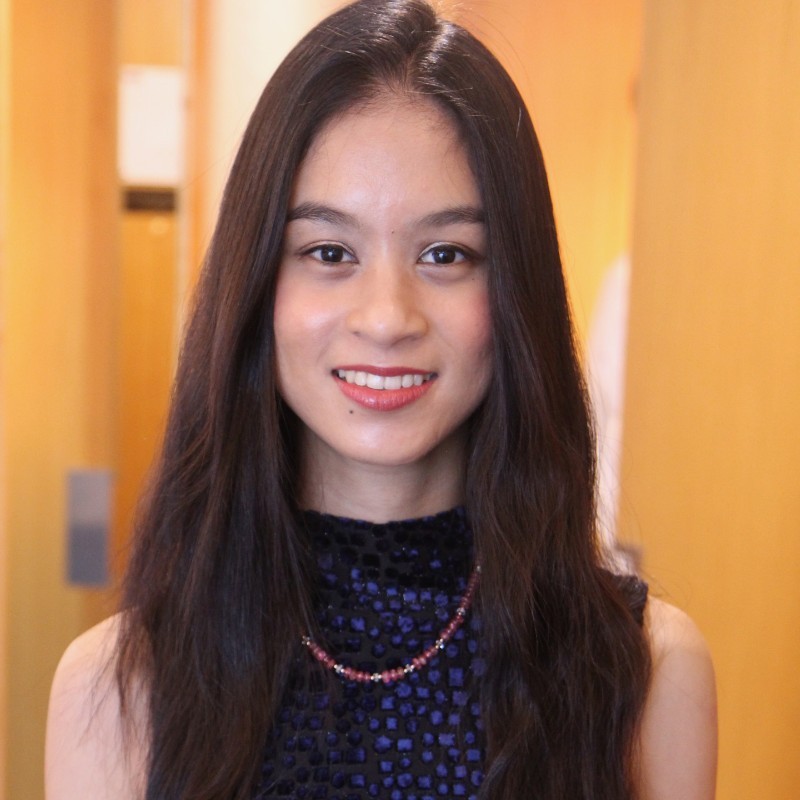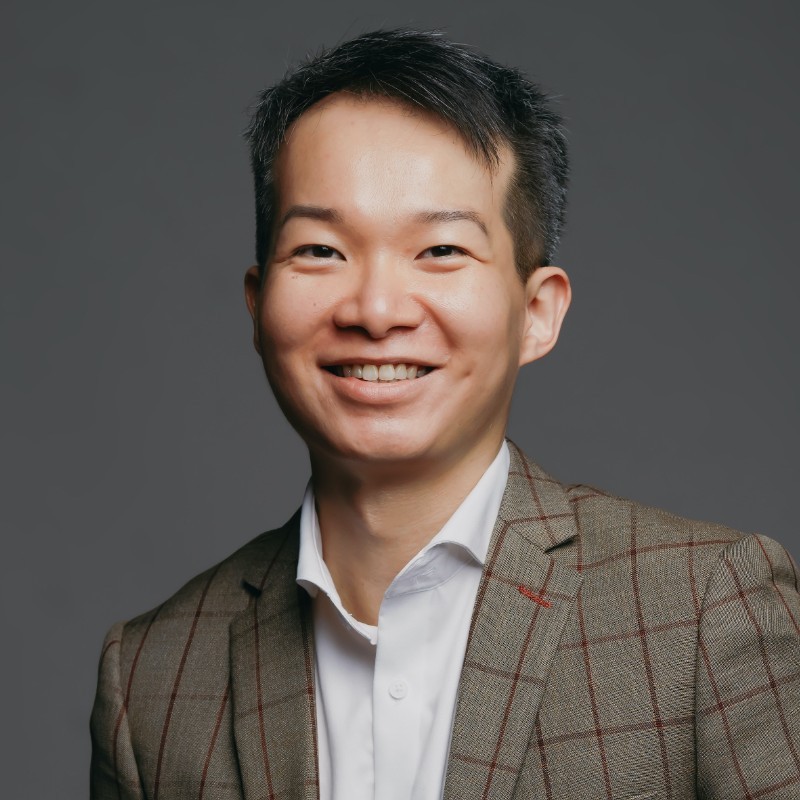
Why pursue graduate study in
English, Linguistics and Theatre Studies?
The Department of English, Linguistics and Theatre Studies offers graduate programmes in three areas: English Language and Linguistics, Literary Studies as well as Theatre and Performance Studies. These programmes provide both an extensive education and a specialist discipline, enabling students to develop flexibility and range, coupled with specific transferable skills.
Students learn to be critical and creative in their thinking, to evaluate and manage complex information and to construct arguments. They master the arts of speaking and writing with clarity, precision and elegance: highly coveted skills in the modern workplace.
The English Language and Linguistics programmes provide a range of courses that offer expertise at an advanced level in foundational areas of language study, including grammatical structure of language, sound structure of language, and language use in social context.
The English Literature graduate programmes cover a variety of historical periods and interdisciplinary fields, with experienced faculty members fluent in British and American literatures, in South Asian, Southeast Asian and other emerging anglophone literatures, in film and visual culture, and in critical and cultural theory.
Theatre and Performance Studies fosters and supports rigorous scholarly exchange and innovative theatrical experimentation located in Asia. Our programmes are reputed for their cutting-edge and quality scholarship in theatre and performance concerned with the aesthetic expressions, cultural dynamics and social forces of a diverse and fast-changing contemporary Asia.

A Brief Introduction
Graduate Programme Coordinators
A/P Vincent Ooi (Research) & A/P Michelle Lazar (Coursework)
English Language and Linguistics Graduate Coordinators
A/P Anne Thell (Research) & Dr Tania Roy (Coursework)
English Literature Graduate Coordinators
A/P Liang Peilin (Research) & A/P Maiya Murphy (Coursework)
Theatre and Performance Studies Graduate Coordinators
Programmes & Curriculum
Master of Arts in English Language and Linguistics (Coursework)
The Master of Arts in English Language and Linguistics (Coursework) is a fully taught programme, designed to be completed in one year of intensive full-time study, or over a longer period of part-time study. Only those locally domiciled are eligible for part-time study.
Course Structure
To qualify for the degree of Master of Arts in English Language and Linguistics, candidates will be required to complete 40 units or 10 courses (each course is worth 4 units).
These 10 courses must include:
- One compulsory course: ELC5104 Approaches to Language
- A minimum of 5 other EL or ELC level-5000 courses
- A maximum of 2 non-EL or non-ELC level-5000 courses on related subjects (subject to department approval)
- A maximum of 2 EL level-4000 courses (subject to department approval)
Master of Arts in English Language and Linguistics (Research)
The maximum duration for both full-time and part-time study is 36 months. Those awarded an NUS scholarship are required to reside in Singapore for the duration of the scholarship award.
Course Structure
To qualify for the degree of Master of Arts in English Language and Linguistics (Research), candidates will be required to:
- successfully complete four courses, which must include
- EL6770 Graduate Research Seminar
- One elective may be a level 4000 course.
- obtain a minimum GPA of 3.00 for all examinable courses. The candidature of a student will be terminated if he/she:
- obtains a GPA of less than 2.5 for two consecutive semesters, or less than 3.0 for three consecutive semesters; or
- fails more than two courses
- successfully complete a dissertation of not more than 30,000 words.
Doctor of Philosophy in English Language and Linguistics
The maximum duration for both full-time and part-time study is 60 months. Those awarded an NUS scholarship are required to reside in Singapore for the duration of the scholarship award.
Course Structure
To qualify for the degree of PhD in English Language and Linguistics, candidates will be required to pass a minimum of 24 units or six courses (each course is worth 4 units) from the English Language and Linguistics curriculum. The following conditions must be fulfilled:
- Of these six courses, the following is compulsory:
- EL6770 Graduate Research Seminar
- Of the remaining five courses, one must be at level 6000.
- No more than one course may be at level 4000.
- obtain a minimum GPA of 3.5 for all examinable courses. In order to continue in the PhD programme, a candidate must not have:
- a GPA of less than 3.5 for three consecutive semesters; or
- a GPA below 3.0 for two consecutive semesters.
- reside in Singapore for a minimum of 18 months of the candidature
- pass all components of the Qualifying Exam (QE)
- successfully complete and defend a thesis of not more than 80,000 words.
Master of Arts in Literary Studies (Coursework)
The Master of Arts (Literary Studies) is a fully taught programme on a course unit system. By taking taught courses, students develop advanced knowledge and critical skill in contemporary literary studies. Students will take 10 dedicated MA courses: 3 foundational courses, and 7 chosen from a range of more specialised electives. Of these, students may also include an Independent Study course where they conceive their own short research essay in consultation with a faculty supervisor.
Course Structure
To obtain the MA in Literary Studies, candidates are required to:
1. pass a minimum of 40 units or ten courses (each course is worth 4 units). The ten courses (40 units) should comprise:
- 3 foundational courses:
- ENC5149: Literary Studies: Overview and Writing Practices
- ENC5150: Survey of the Discipline: Methods and Approaches
- ENC5151: Global Anglophonic Literature
- 7 courses selected from an available selection, which may include an Independent Study course.
Candidates who have completed equivalent courses which were not used towards obtaining another degree prior to admission to the Master of Arts (Literary Studies) may apply to the Head of Department for an exemption of course(s), subject to a maximum of 50% of the MA requirements.
2. obtain a minimum GPA of 3.00 for all examinable courses.
Master of Arts in English Literature (Research)
The maximum duration for both full-time and part-time study is 36 months. Those awarded an NUS scholarship are required to reside in Singapore for the duration of the scholarship award.
Course Structure
To qualify for the degree of Master of Arts in English Literature (Research), candidates will be required to:
- successfully complete four courses, three of which must be at level 5000 or 6000.
In English Literature, there is one compulsory course: EN6770 (Graduate Research Seminar) - obtain a minimum GPA of 3.00 for all examinable courses. The candidature of a student will be terminated if he/she:
- obtains a GPA of less than 2.5 for two consecutive semesters, or less than 3.0 for three consecutive semesters; or
- fails more than two courses
- successfully complete a dissertation of not more than 30,000 words.
Doctor of Philosophy in English Literature
The PhD in English Literature trains students to become independent scholars, teachers, critics and thinkers in the arena of literature and, more broadly, the arts. During the programme, students do coursework, six taught courses, embark on a Qualifying Exam and write an 80,000 word thesis.
Course Structure
To obtain the degree of PhD in English Literature, candidates will be required to:
- pass six courses, at least three of which must be at level 6000
In English Literature, there are two compulsory courses: EN6770 (Graduate Research Seminar) and EN6102 (Advanced Critical Reading) - obtain a minimum GPA of 3.5 for all examinable courses. In order to continue in the PhD programme, a candidate must not have:
- a GPA of less than 3.5 for three consecutive semesters; or
- a GPA below 3.0 for two consecutive semesters.
- reside in Singapore for a minimum of 18 months of the candidature
- pass all components of the Qualifying Exam (QE)
- successfully complete and defend a thesis of not more than 80,000 words.
Master of Arts in Theatre and Performance Studies (Coursework)
The Master of Arts in Theatre and Performance Studies (Coursework) is designed to be completed in one year of full-time study, or over a longer period of part-time study. (Only those locally domiciled are eligible for part-time study.)
Course Structure
To obtain the MA in Theatre and Performance Studies, candidates are required to:
- pass a minimum of 40 units or ten courses (each course is worth 4 units). The ten courses should include:
-
- 1 core course: TPS5101 Text and Performance
- 9 courses chosen from an available selection, with at least one from each of our three curricular focus areas listed below:
- Theatre, Film and Literature
- Creative Practices in Performance
- Digital Skills in Arts and Humanities
- A maximum of one course may be an Independent Study (arranged with one of our faculty members).
- obtain a minimum Grade Point Average (GPA) of 3.00 for all examinable courses.
Master of Arts in Theatre and Performance Studies (Research)
Comprising four taught courses and a 30,000 word thesis, the MA by Research in Theatre and Performance Studies offers students the opportunity to strengthen their knowledge of the field, and to conduct innovative research into a specific aspect of it.
The maximum duration of study for both full-time and part-time study is 36 months. Those awarded an NUS scholarship are required to reside in Singapore during the duration of the scholarship award.
Course Structure
To obtain the degree of Master of Arts in Theatre and Performance Studies (Research), candidates will be required to:
- successfully complete four courses, three of which must be at level 5000 or 6000.
In Theatre and Performance Studies, there are two compulsory courses: TS5101 (Text and Performance) and TS6770 (Graduate Research Seminar) - obtain a minimum GPA of 3.00 for all examinable courses. The candidature of a student will be terminated if he/she:
- obtains a GPA of less than 2.5 for two consecutive semesters, or less than 3.0 for three consecutive semesters; or
- fails more than two courses
- successfully complete a dissertation of not more than 30,000 words.
Doctor of Philosophy in Theatre and Performance Studies
Comprising six taught courses, a Qualifying Examination, an 80,000 word thesis and an oral examination, the PhD in Theatre and Performance Studies offers students the opportunity to cement a comprehensive knowledge of the field, and to conduct original research into a specific aspect of it.
The maximum duration for both full-time and part-time study is 60 months. Those awarded an NUS scholarship are required to reside in Singapore during the duration of the scholarship award.
Course Structure
To obtain the degree of PhD (Theatre and Performance Studies), candidates will be required to:
- pass six courses, at least three of which must be at level 6000
In Theatre and Performance Studies, there are two compulsory courses: TS5101 (Text and Performance) and TS6770 (Graduate Research Seminar) - obtain a minimum GPA of 3.5 for all examinable courses. In order to continue in the PhD programme, a candidate must not have:
- a GPA of less than 3.5 for three consecutive semesters; or
- a GPA below 3.0 for two consecutive semesters.
- reside in Singapore for a minimum of 18 months of the candidature
- pass all components of the Qualifying Exam (QE)
- successfully complete and defend a thesis of not more than 80,000 words.
Job Ready
The English Language, English Literature and Theatre Studies graduate programmes provide both a broad-based education and a specialist discipline. The breadth develops our students’ flexibility and range, and the disciplines equip them with specific transferable skills. Our students learn to be critical and creative in their thinking, to evaluate and manage complex information and to construct arguments. Often, they are particularly strong in English. They express themselves in both speech and writing with clarity, precision and elegance: crucial and highly valued skills in the modern workplace.
As a result, students from our Department pursue many different careers upon graduation, and our alumni are represented in a wide range of fields:
- Creative practice in theatre, film, television and writing
- All sectors of the civil service
- Graduate research and university teaching
- Banking, finance and consultancy
- Speech pathology and speech therapy
- Translating and interpreting
- Publishing, marketing, public relations, event management
- Management and business administration
- Entrepreneurship
- Teaching and educational management at all levels of the school system
- Arts, entertainment and media industries, advertising, journalism.
Testimonials

Lauren Yeo
Masters Student in English Language and Literature
My English Language programme provided me with countless opportunities to hone my skills and further my academic interests. Thanks to the support and guidance of my many wonderful professors, I was well-equipped to take on various professional research and teaching roles upon graduation. My time at the department was a truly enriching and enjoyable one!
Roweena Yip Leileng
PhD Student in Theatre and Performance Studies
My experience pursuing a PhD in Theatre and Performance Studies in NUS has been very enriching, both intellectually and personally. I received both my undergraduate degree in English Literature and Masters degree in Renaissance Literature from the University of Edinburgh (United Kingdom), and moved to Singapore with the hope of developing meaningful research while being based in Southeast Asia. Graduate training at NUS is rigorous and comprehensive, with a focus on professionalisation and expanding opportunities for research.
My transition from literature into theatre studies was encouraged by faculty members and fellow students within Theatre Studies, who continue to support my ongoing research in the intersections between intercultural Shakespeare in Asia and feminist theory. The community in TS is vibrant and dynamic, with a wide range of research being conducted by faculty and graduate students. and opportunities to discuss our work at the end of every semester during TS Research Day.


Tan Teck Heng
PhD in English Literature, '21
I have studied English Literature at NUS since 2009, and the department's support has been immense, from my undergraduate years to my Masters and now, a joint PhD with King's College London. I received excellent supervision and mentorship, and was given opportunities to teach and lead seminars across various levels. My training at NUS prepared me well for the new challenges at King's Comparative Literature department, where I taught in a different environment, gained access to British networks and resources, and learnt from scholars working in an adjacent discipline.
Nearer to home, the department has forged connections with entities including the Coalition of English Departments in Asia, and the Modernist Studies In Asia Network. Such international presence has enhanced my research on anglophone modernism and modern Chinese writing. Beyond the top-notch quality of the programme, I am also grateful for my scholarship and funding support, which allowed me to pursue my ambitions with peace of mind.
The Faculty of Arts and Social Sciences, National University of Singapore (NUS) is committed to environmental sustainability.
This e-brochure is part of our sustained effort to reduce waste and foster a culture of care for the environment among the NUS and broader community.

